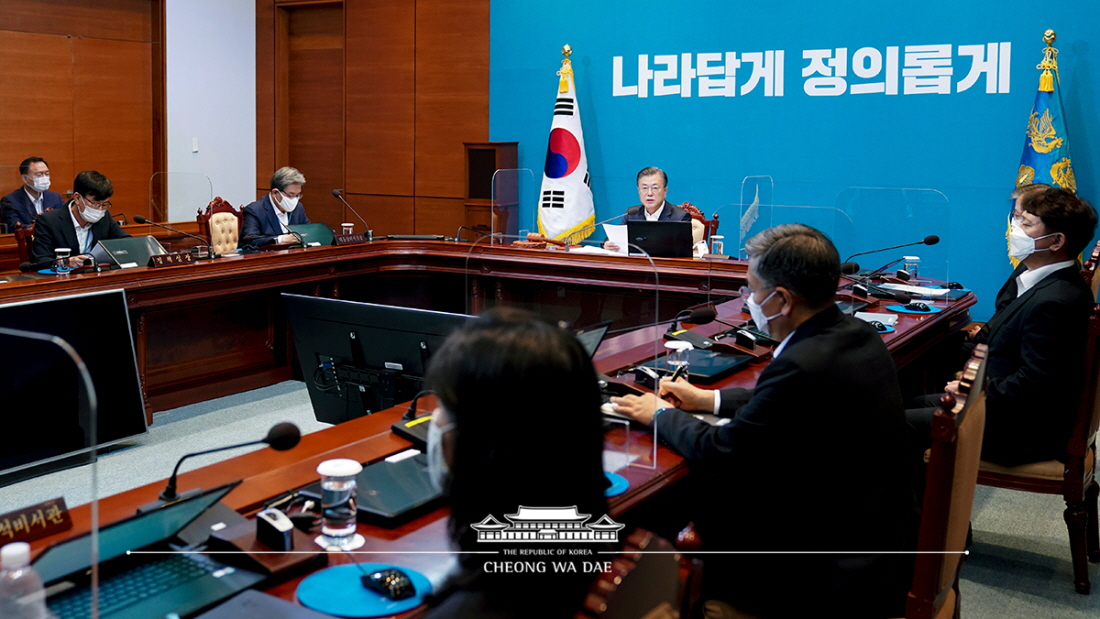이 웹사이트는 제19대 대통령 임기 종료에 따라 대통령기록관이 「대통령기록물 관리에 관한 법률」에 의해 이관받아 서비스하는 대통령기록물입니다. 자료의 열람만 가능하며 수정 · 추가 · 삭제는 불가능합니다.
다만, 「개인정보보호법」에 의하여 개인의 정보를 보호받기 원하시는 분은 관련 내용(요청자, 요청내용, 연락처, 글위치)을 대통령 웹기록물 담당자(044-211-2253)에게 요청해 주시면 신속히 검토하여 조치해 드리겠습니다. 감사합니다.
SPEECHES & REMARKS
BRIEFINGS

Let me begin the 51st Cabinet Meeting.
We are all going through a difficult time due to the prolonged COVID-19 pandemic. Especially, I want to extend my sympathy and encouragement to SMEs, small- and microbusiness owners and the self-employed who are bearing the brunt of the economic damage. The Government is anxiously working to mitigate their difficulties, create new opportunities and instill them with hope. We issued 77 percent of the customized emergency relief payments from the fourth supplementary budget prior to the Chuseok break by focusing on rapid disbursement.
The Government will help further alleviate the burden of operating costs for microbusiness owners and the self-employed. In addition, we will work to help lessen rent burdens by extending the tax incentive period for those who participate in the Good Landlord campaign. At the same time, the Government will implement a policy to ease the burden of electricity bills. We will also reinforce the livelihood safety net by reviving businesses in residential neighborhoods and expanding the provision of credit guarantees for local microbusiness owners.
Moreover, we will further strengthen systematic support for SMEs in crisis. We will establish a system to identify a crisis in a timely manner and swiftly provide customized support. For those SMEs hit hard by COVID-19, we will provide greater support through emergency financing and put in place a system to facilitate and support transitions into new more-promising business lines.
SMEs are the root and center of our economy. Even while taking a direct blow from the COVID-19 outbreak, our SMEs are at the forefront of generating hope for our economy. Exports of items essential for epidemic prevention and contact-free living – products mainly produced by SMEs – have increased sharply. Despite a sharp decline in total exports, our SMEs are performing relatively well and serving remarkably as a buttress for our exports.
In addition, SMEs are faithfully playing their role of turning crises into new opportunities. In the face of the COVID-19 crisis, employment has increased at business ventures that specialize in contact-free technologies, contributing significantly to job creation. As such, the axis of employment is shifting to business ventures and startups. The number of tech-based startups continues to increase, and innovative technologies and products developed by business ventures and startups such as Corona Map, Mask Map and diagnostic test kits are playing a key role in Korea’s COVID-19 responses.
While actively protecting small- and microbusiness owners and the self-employed, the Government will further nourish the hopes being generated by SMEs and business ventures. We will strive to ensure that they play a pivotal role in an economic rebound that will help overcome the COVID-19 era and surely serve as key players in the digital economy that ushers in the post-COVID-19 era.
Suffering caused by COVID-19 has brought home the fact that innovation is the only way to guarantee our survival. Innovation at manufacturing plants and other smokestack industries as well as conventional SMEs is all the more urgent. The Government will accelerate its support for innovation in the manufacturing process, for instance, by increasing the number of smart factories. In addition, we will strengthen support to facilitate adaption to a contract-free economy – one characterized by increased online distribution and consumption – and will focus efforts on customized support to expand our exports and overseas markets.
Creation of the world’s leading digital powerhouse rests upon the shoulders of SMEs and innovative business ventures. The Government will provide vigorous support for our SMEs in manufacturing, so they can innovate into AI- and data-driven companies. As part of the Korean New Deal, the Government will intensively nurture business ventures and startups in the contact-free, digital and green sectors and other promising areas. We will also further expand our institutional foundation for stimulating innovative business ventures and startups. We will develop an industrial ecosystem where large companies and SMEs grow simultaneously in mutually beneficial ways in new key industries, such as next-generation semiconductors, future cars and biohealth.
At today’s Cabinet Meeting, we will deliberate the enforcement ordinances intended to add structure to the system supporting mutually beneficial cooperation for public procurement and the system requiring public institutions to prioritize products from startups when making purchases. These are aimed at creating an ecosystem where SMEs are given preferential treatment in public procurement and to help startups secure an initial consumer base. The role and weight of SMEs, startups and business ventures will be expanded, and businesses’ innovation and growth potential will be given emphasis.
My Administration established an entirely new ministry, the Ministry of SMEs and Startups, and has been unceasingly striving to create an economy that is centered on SMEs, business ventures and microbusiness owners. We have pushed a second venture boom and the great transformation into a digital economy. We have also nurtured microbusiness owners and self-employed businesses through policies tailored exclusively for them. What we do from now on has even graver importance. I hope that the three-year comprehensive plan to foster SMEs – to be discussed today – will change the fundamentals of our economy, help achieve a successful transition to a digital economy and build the foundation for Korea to leap forward toward a pacesetting economy.



